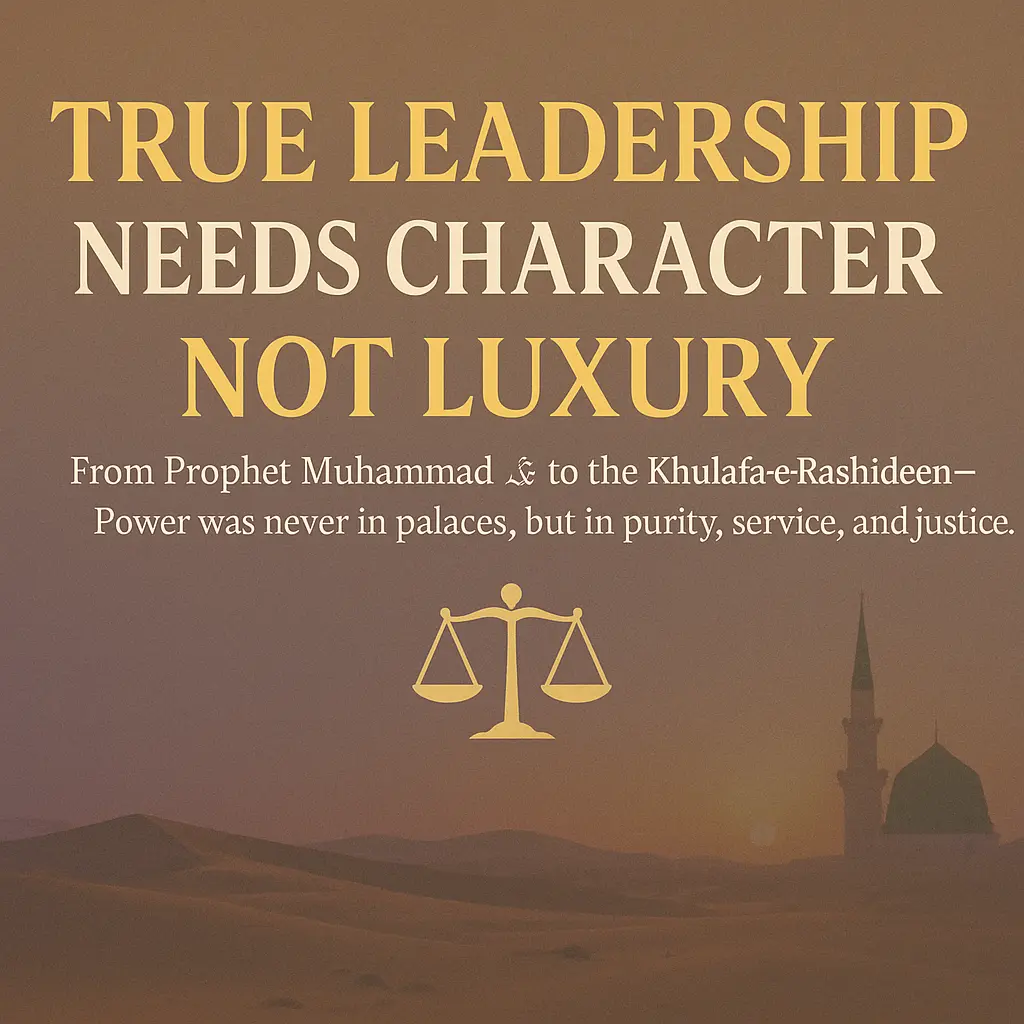In every age, humanity has been dazzled by the outer shine of power — palaces, motorcades, and grandeur. Yet history repeatedly whispers a deeper truth: the greatest leaders were never defined by luxury, but by their humility, justice, and service.
The worth of a leader lies not in possessions, but in purpose. Real leadership radiates from integrity, compassion, and courage — not from wealth or position.
From the simplicity of Prophet Muhammad ﷺ and the Rightly Guided Caliphs, to the integrity of Malik Meraj Khalid, the sincerity of Kolinda Grabar-Kitarović, and the moral example of Nelson Mandela and Mahatma Gandhi, history shows that leadership grounded in humility endures long after power fades.
🌙 Prophet Muhammad ﷺ — The Eternal Beacon of Humble Leadership
No figure in human history combined power with humility as profoundly as Prophet Muhammad ﷺ.
Despite being the most influential leader in the world, he lived in a small, unadorned home, slept on a simple mat, and owned very little. He mended his own clothes, milked his own goat, and shared his meals with the poor.
When Mecca was conquered — the very city that had exiled him — he entered not as a triumphant emperor but as a humble servant of God, his head bowed in gratitude.
He forgave his enemies, transforming revenge into mercy and humiliation into victory of the soul.
He said:
“The leader of a people is their servant.”
His life stands as a timeless example that true greatness lies not in commanding others, but in serving them.
Through humility, moral strength, and compassion, Prophet Muhammad ﷺ built not only an empire — but a civilization of conscience.
🕌 The Rightly Guided Caliphs — Humility as the Foundation of Power
The four Caliphs who succeeded the Prophet ﷺ — known as the Khulafa-e-Rashideen — carried forward his legacy of modest, service-based leadership.
Abu Bakr (RA): The Symbol of Selfless Duty
After being chosen as the first Caliph, Abu Bakr (RA) continued his simple trade until reminded that leading the Ummah required his full attention. His reply was gentle: “If I serve the people, God will provide.”
He donated his entire wealth to the cause of Islam, keeping nothing for himself. His strength was moral, not material.
Umar ibn al-Khattab (RA): Justice Over Comfort
Umar (RA) ruled over vast lands stretching from Persia to Egypt — yet he slept on the ground, wore patched clothes, and walked unguarded among his people.
He personally inspected homes at night to ensure no family went hungry.
When a woman complained of hunger, he carried a sack of flour on his own back, saying:
“If the people suffer, Umar will answer to Allah.”
His rule remains one of history’s greatest examples of justice without privilege.
Uthman ibn Affan (RA): Wealth as a Tool for Good
A successful merchant before Islam, Uthman (RA) used his wealth for the public good — buying wells, funding armies, and financing the compilation of the Qur’an.
Despite great wealth, he lived simply and avoided extravagance, proving that true prosperity is generosity, not luxury.
Ali ibn Abi Talib (RA): Wisdom and Simplicity Combined
Ali (RA), the fourth Caliph, was a man of profound intellect and courage. He lived humbly, repaired his own clothes, and worked with his hands.
He declared, “Shall I be content with being called the Commander of the Faithful if I do not share the hardships of the faithful?”
His simplicity reflected his justice — a justice that still inspires leadership models across time.
Together, these four leaders defined the moral gold standard of governance: authority without arrogance, and power without pride.
🇵🇰 Malik Meraj Khalid — Integrity in the Age of Corruption
In Pakistan’s often tumultuous political history, Malik Meraj Khalid stands as a rare symbol of moral clarity.
Born in a modest farming family, he rose through education, integrity, and service to become Caretaker Prime Minister in 1996.
As Prime Minister, he refused the perks of power — traveling without a heavy convoy, cutting unnecessary expenses, and rejecting luxury vehicles.
He lived simply, worked sincerely, and left office with his reputation untarnished.
His leadership proved that governance rooted in humility and honesty can restore faith in institutions.
In an era of extravagance, Meraj Khalid’s simplicity was his most powerful statement.
🌍 Kolinda Grabar-Kitarović — Modern Symbol of Accessible Leadership
In today’s world of political pomp, Kolinda Grabar-Kitarović, Croatia’s first female president (2015–2020), became a global example of approachable leadership.
A former diplomat and NATO official, she carried her responsibilities with grace and humility.
She often traveled on commercial flights, rejected unnecessary protocol, and mingled freely with citizens.
During the 2018 FIFA World Cup, she won hearts worldwide by cheering for her national team from the public stands — wearing the Croatian jersey, not regal attire.
Her modesty reflected genuine patriotism: she represented her people, not just ruled them.
Her initiatives like the Three Seas Initiative showed her commitment to practical progress over personal luxury — demonstrating that leadership earns respect through authenticity, not extravagance.
🌸 Nelson Mandela — The Moral Power of Forgiveness
Emerging from 27 years in prison, Nelson Mandela could have sought revenge — instead, he offered reconciliation.
As South Africa’s first Black president, he chose forgiveness over vengeance and unity over privilege.
He lived modestly, refused to indulge in personal wealth, and treated political opponents with grace.
Mandela’s moral courage, humility, and humanity transformed him from prisoner to peacemaker — embodying the truth that humility, not hatred, defines real strength.
🌾 Mahatma Gandhi — Simplicity as Strength
Mahatma Gandhi transformed simplicity into a global philosophy.
He gave up wealth, wore homespun cloth, and lived among the poor.
His spinning wheel became a symbol of self-reliance, and his modest hut a place of global pilgrimage.
He once said:
“The best way to find yourself is to lose yourself in the service of others.”
Through minimalism, he connected deeply with his people and demonstrated that moral authority grows in proportion to one’s detachment from luxury.
🕊️ Universal Lessons on Humility in Leadership
Whether in sacred history or modern politics, one truth remains constant:
Power that depends on luxury decays. Power anchored in humility endures.
Luxuries create distance between a ruler and the ruled.
Humility builds trust, empathy, and unity — the real foundations of leadership.
A leader who walks with the people earns their hearts; a leader who hides behind gates loses them.
When leaders choose service over status, the world remembers them not for their wealth but for their wisdom, justice, and compassion.
⚖️ Conclusion: Character Is the Ultimate Crown
From Prophet Muhammad ﷺ and the Khulafa-e-Rashideen to Meraj Khalid, Kolinda Grabar-Kitarović, Nelson Mandela, and Mahatma Gandhi, the lesson is clear:
“A leader’s true crown is not gold, but integrity.”
True leadership is service without pride, strength without arrogance, and power without greed.
Luxuries fade. Titles perish. But moral character — the ability to lead with conscience, humility, and compassion — lives forever.
In the end, true leadership does not need luxuries. It needs the courage to live simply and serve greatly.










